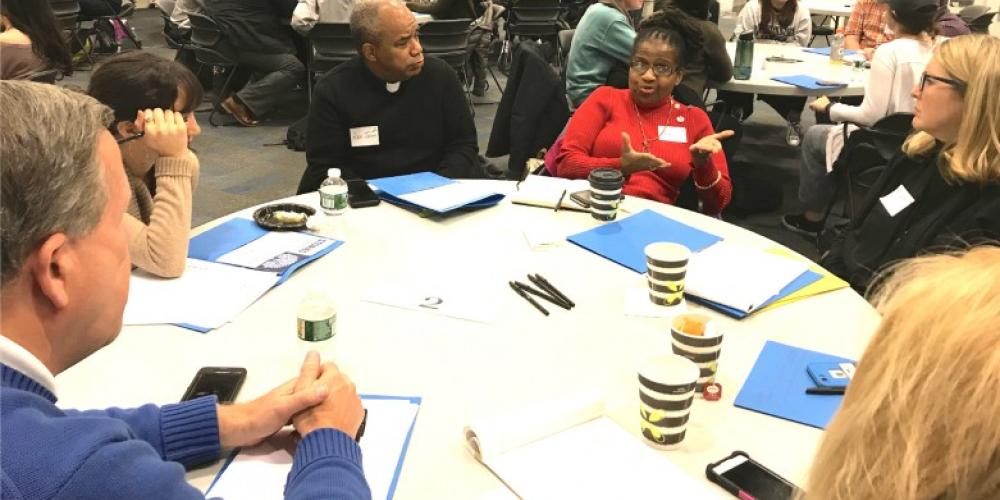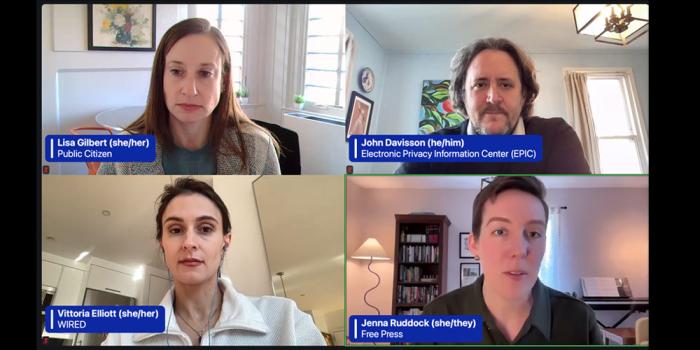'Local News Is Just Missing'

When it comes to news media, the young are restless — with reason.
That was a key takeaway from the latest News Voices: New Jersey community forum about the Civic Info Bill, which would invest $100 million over five years to give residents the news and information they need. The money would come from the $332-million windfall New Jersey earned from selling off its public-television licenses.
The session at the College of New Jersey (TCNJ) drew the largest attendance of any of the 10 forums that Free Press Action Fund’s News Voices project has held this year.
A big chunk of the 60-plus people who gathered around tables in TCNJ’s bustling Education Building were under the age of 25, many of them students in the college’s journalism program.
Even though these students are just coming into the journalism field, they know what good journalism should look and sound like. And they praised recent examples of top-notch stories — featuring reporters who spoke to multiple sources, offered balance, showed up to get the full story, took care with emotional topics, and dug below the surface.
The students cited as exemplary the reporting on the aftermath of Superstorm Sandy, the recent spate of investigative pieces on sexual harassment and coverage of the recent budget stalemate in Trenton.
But mostly, they said, the news diets they find themselves stuck with tend to lack those nutritious ingredients.
TCNJ students from around the state lamented that on the rare occasions when major media are drawn either to their campus or their hometowns, it’s usually by a spectacular crime or a flaming controversy. And they said the resulting coverage is usually thin, short on context and low on concern for the emotions of those involved.
Examples cited included a shooting near the TCNJ campus and a football players’ anthem protest at the hometown high school of one of the students.
Agreeing with the older participants around the tables, the students noted it’s rare these days to find sustained, detailed coverage of local communities that’s informed by solid background. And they described the resulting damage.
“The big problem is that local news is just missing,” one student said. “You won’t know about local decisions, but you will feel the effect.
One participant, an administrator for a township near Trenton, said that when local reporters used to routinely write advance stories on township meetings where big issues would be discussed, hundreds of people might show up for a session.
Now, he said, at best one reporter might call after the fact for information on a meeting’s results. So these days, he added, only a handful of residents shows up for meetings.
“Makes it easier for us in some ways,” he said. “But it’s not good, really.”
Some students expressed sharp skepticism about social media, particularly Twitter, as a sufficient news source. This sample of college students, which included many aspiring journalists, was probably more media-savvy than the norm.
But participants of all ages at earlier News Voices forums echoed these doubts about Twitter and Facebook.
Based on these forums, at least, those platforms’ honeymoon period of being viewed as reliable, good-faith purveyors of news is coming to an end.
Participants in the TCNJ forum noted — as earlier forum attendees have — that the best local news coverage keeps you informed about the good and the bad in both your own community as well as neighboring towns you might otherwise know only by stereotype.
With all that as a backdrop, Free Press Action Fund staffers Mike Rispoli and James Thompson had an attentive audience when they explained what the Civic Info Bill would do. It would use $100 million of state money over five years to create a nonprofit fund that would support innovations in local news and civic technology across New Jersey.
The fund, the Civic Information Consortium, would partner with media outlets, community groups and five research universities. Representatives of the schools would have seats on the fund’s board and would link initiatives to useful academic research.
TCNJ’s journalism professors, including department chair Donna Shaw, have been enthusiastic proponents of the bill and the college’s participation. The original bill listed Montclair State, New Jersey Institute of Technology, Rowan University and Rutgers University as university partners, but the hope is to add TCNJ when the legislature next takes up the bill.
Student participants at the forum expressed enthusiasm for some innovative ideas for how to use the fund that News Voices developed through conversations with the public:
- Media literacy training (the “fake-news antidote”) for students and adults alike.
- “Report for New Jersey” fellowships that would place young journalists with established outlets to improve coverage of underserved communities.
- “Augmented reality” smartphone apps that would put government data at the fingertips of ordinary people in easy-to-use visual form.
Students also spoke up for some traditional ideas:
- Putting more journalistic boots on the ground in local communities.
- Providing more coverage that links national and state issues to local concerns.
- Profiling civically engaged community members, including residents who have historically been overlooked, and focusing less on shallow coverage of celebrities.
State Assembly Majority Leader Louis Greenwald (D–Camden) and Senate Majority Leader Loretta Weinberg (D–Bergen) introduced the Civic Info Bill last June, and Free Press Action Fund will work with the legislation’s sponsors to pass the bill during either the 2017 lame-duck session or in 2018.
Public testimonials and activism have given the Civic Info Bill a great deal of momentum. Urge your lawmakers to pass it and rebuild community media.




